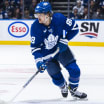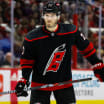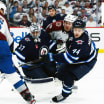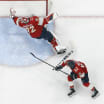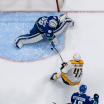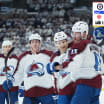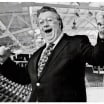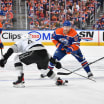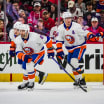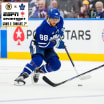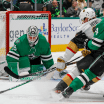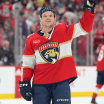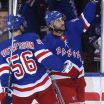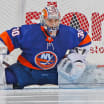DETROIT -- After Jared Coreau's first professional season, Jeff Blashill was brutally honest.
Coreau was an undrafted goaltender out of Northern Michigan University who had played 25 games for the Detroit Red Wings farm teams -- five for Grand Rapids of the American Hockey League, 20 for Toledo of the ECHL -- and had won one of them.
Jared Coreau turning around career, Red Wings
Goalie overcomes early struggles to help Detroit remain in playoff race
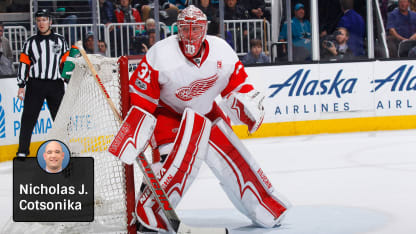
One.
His record: 1-16-6 combined.
Blashill, a former college goaltender, was the coach in Grand Rapids. He told Coreau he needed to improve his eyes. He told Coreau he needed to lose weight. He told Coreau he had a long way to go to make it as a pro, let alone make it to the NHL.
"He didn't hold anything back," Coreau said. "He told me everything I needed to hear."
Less than three years later, Coreau is playing for Blashill in Detroit at a critical point.
With Petr Mrazek struggling, Jimmy Howard injured and their 25-season Stanley Cup Playoff streak in jeopardy, the Red Wings called up Coreau and threw him into pressure situations, from starting the 2017 Scotiabank NHL Centennial Classic in his fourth NHL game, to facing Vezina Trophy winners Henrik Lundqvist, Carey Price and Tuukka Rask.
His record: 5-1-2 with two shutouts.
He is slated to start against the Boston Bruins at TD Garden on Tuesday (7 p.m. ET; SN, NESN, FS-D, NHL.TV), a game the Red Wings badly need to win because they trail the Bruins and several other teams in the playoff race.
"I still have a lot to prove," Coreau said. "I just have to go in every night with the attitude to win and help the guys."
Can you imagine winning one game your first professional season? How would that shake your confidence and your bosses' confidence in you? How would you react? How would they?
"That was a tough year," said Red Wings goaltending coach Jeff Salajko, who spent the past three seasons as the goaltending development coach in Grand Rapids. "We put a plan together for him -- not even a plan. We just threw out suggestions, and he took everything to heart."
Coreau sought out vision training, lost about 15 pounds and saw a sports psychologist.
"There were definitely some doubts," Coreau said. "But one thing my mother always told me -- I think it's very true -- it's not how many times we succeed. It's how many times we fail and get up and keep moving forward. So that was a year of some mistakes and some failures. I did my best to learn from them."
The vision training improved Coreau's focus and reaction time. He worked with a device made by Dynavision, a black board with circles of lights in a target pattern. In 30-minute sessions two or three times a week -- no more or he would start seeing shapes in his eyes -- he would stare at the center of the screen and hit the lights when they turned red. At first, he could hit 20 or 30 a minute. Now, he can hit around 160. He sees the puck coming at him more clearly, looks the puck into his trapper and holds his stare on it for an extra second or two.
The weight loss improved his agility and flexibility. He wasn't bulky before, but he was 6-feet-6, 235 pounds and muscular. Now he's 220 and lighter on his edges. He's faster and feels better in games. At his best, he's big and boring, using his size to his advantage with positioning, but he's athletic too.
The sports psychology strengthened him mentally. Coreau has big-picture perspective and little routines to which to return day after day -- when things go well, when they don't, always the same. At 25, he seems calm no matter the situation.
"His size is one thing," Salajko said. "You've got a lethal combination when you combine his size with his work ethic and his attention to detail. He's probably one of the best students of the game I've ever been around."
Coreau went 16-8-1 with a .927 save percentage and three shutouts for Grand Rapids in 2014-15. He went 29-15-2 with a .922 save percentage and six shutouts for Grand Rapids last season. He has gone 11-6-0 for Grand Rapids with a .924 save percentage and one shutout this season.
He has a .904 save percentage for Detroit, but some short bursts of goals against have hurt his numbers. Salajko said they have been working on it. But at times, like when he allowed three goals on eight shots and was pulled against the Bruins on Wednesday, it has been more on team defense.
"He made big changes in his game from his Year 1 pro to Year 2, and he started to really build a resume in the American League," Blashill said. "That's the first area where you start to gain confidence in a guy. And then once they get up, you put them in, and as they do a good job, you gain more confidence in them. … It's a step by step approach, and I think he's taken good steps."
In the past 10 days, Coreau has faced Sidney Crosby, Evgeni Malkin and the Pittsburgh Penguins -- two of the top three scorers and the top-scoring team in the League -- and won 6-3. He has faced Price, the 2015 Vezina winner, and the Montreal Canadiens, the Atlantic Division leaders, and won 1-0. He has faced Lundqvist, the 2012 Vezina winner, and the New York Rangers, the second-highest scoring team in the League, and lost 1-0 in overtime.
The challenge is to keep it up and force the Red Wings to make difficult decisions in the short and long terms. Mrazek has been better lately. Howard is skating and should be ready to return in two or three weeks, after the All-Star break (Jan. 27-30), practice time and perhaps a brief stint in Grand Rapids for conditioning. With points so precious -- and the expansion draft looming in June -- the coaches and executives are evaluating game by game.
"There's something to be said when a kid finds a way to win," Salajko said. "Now as the season mounts, if he continues to get these opportunities … we want to see: Can he handle it?"
Coreau will do everything he can. Since the Red Wings called him up, he has been eating even healthier and sleeping even earlier than usual. After his 1-0 win against Price and the Canadiens, a game that started at 3 p.m. and preceded a day off, the guy who won once his first pro season celebrated by eating chicken, spinach salad and veggies at the rink and going to bed about 11.
"With the magnitude of the opportunity, it's fairly easy [to keep a narrow focus]," Coreau said. "This is the level that everyone works to get to."

